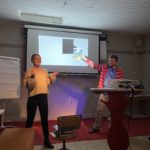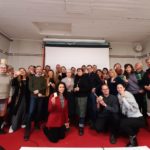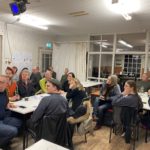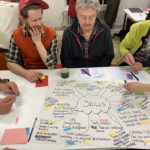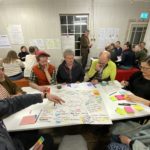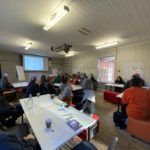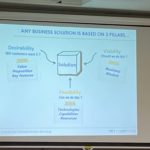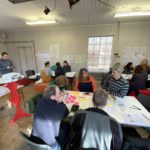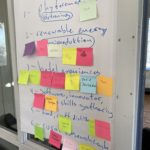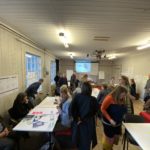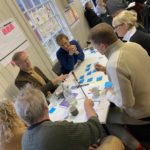Under the framework of H2020 project CLIC, ICHEC Brussels Management School started planning and coordinating four Business Model Workshops in CLIC partner cities/region. Initially, ICHEC conducted a series of virtual meetings with every local partner and its related academic partner in order to agree on the cultural heritage assets to develop the business model for, the format of the workshop, participants’ profiles, experts to be involved, dates and logistics.
During CLIC’s Historic Urban Landscape (HUL) workshop in September 2019 in Sweden, our partner Björn Ohlén from Västarvet (Västra Götaland Region) planned a visit to the Fengersfors paper mill, a magical and unique listed industrial heritage asset in Northern Dalsland. During the visit, CLIC partners had the opportunity to interact with the ‘Not Quite’ collective and learn about their impressive achievements and current challenges. In the course of the meeting, ICHEC explored the possibility of collaboration and voiced CLIC’s interest in assisting the Not Quite collective in developing a viable business model for purchasing and running the paper mill.
Following the HUL workshop, several virtual meetings between CLIC partners, Västra Götaland Region (Björn Ohlén and Vera Telemo), Uppsala University (Jermina Stanojev), ICHEC (Ruba Saleh and Philippe Drouillon) and Not Quite collective (Marcus Haraldsson and Ylva Frid) took place in order to define the challenges and set the priorities. After an intense exchange of correspondence, the storyboard was agreed and the list of participants was confirmed. The business model workshop took place in Fengersfors between 18 to 20 February 2020. On 18 February 2020, during an evening session, the participants got to know each other and started proposing projects. Following a prioritization session, 6 solutions were identified for the future reuse of the paper mill and groups were set.
On 19 February 2020, participants started to explore the site together, thanks to a very inspiring visit led by Karl Hallberg from the Not Quite collective. After the visit, solutions were described and prototyping was launched. At the end of the day, the First Minimal Viable Solution (MVS) was tested. On the 20 February 2020, following the desirability testing, the MVS was updated and the feasibility of the solution was revised. Revenue streams, costs and benefits were developed by each group and five solutions were presented at a final pitch session. The workshop started with six groups and ended up with five because two groups with relevant topics merged into one group on day 3.
After two-day and a half workshop, the participants managed to co-design five revenue streams that together could make a sound and sustainable business model. The workshop was successful because of the motivated and creative minds that worked hard on assessing and answering the needs and prototyped and tested solutions for the adaptive reuse of the paper mill. The successful implementation of this workshop would not have been possible without the hard work of the following people: Björn Ohlén and Vera Telemo from Vastavet, Christer Gustafsson and Jermina Stanojev, from Uppsala University, the beautiful collaboration and wonderful organization of the Not Quite collective who made sure to bring together a group of brilliant people to whom goes our gratitude. Thank you Vera Telemo, Marcus Haraldsson and Karl Hallberg. Finally, ICHEC’s team Ruba Saleh, Christian Ost and Philippe Drouillon who designed and facilitated the workshop and managed to motivate, engage and coach people towards a viable solution in a fun and friendly way! Thank you Philippe!
Following the workshop, ICHEC’s team analyzed the workshop outcomes and a roadmap was set and agreed with Not Quite collective in order to put the Business Model into practice. Due to COVID19 outbreak, the three remaining foreseen Business Model workshops transitioned to remote participation. Our partner ‘Pakhuis de Zwijger’ (Amsterdam) asked ICHEC to change the topic and focus of the workshop in order to synchronise with the current situation and reverberate the repercussions of COVID19 on public places closing their doors. In a nutshell, ICHEC was requested to pivot towards a resilience plan for cultural institutions, a plan that would facilitate a more robust response in a crisis situation. The workshop will be carried out in two distinct sessions of 4 hours. The two sessions will take place in two different days.
As per the Business Model workshops in Salerno and Rijeka, the topics remain unvaried. Therefore, in Salerno, the municipality launched a public open call for projects and the participants will co-design a Business Model for the adaptive reuse of the complex of Edifici Mondo (convents of San Francesco, convent of San Giacomo and San Pietro a Maiella, convent of Santa Maria della Consolazione and Palazzo San Massimo). The remote workshop is structured in five sessions and planned to take place in the format of four-hour session once a week (except for the closing session which will consist of 2 hours).
Rijeka municipality, a CLIC partner city, has recently renovated an industrial building with the aim of transforming it into children’s house. All funds were secured by Europe for the restoration of the Beniçiç building under the framework of Rijeka European capital of Culture 2020. The vision of the municipality is to dedicate the place to educational activities related to art, heritage and circularity for children of the age of 0 to 18. The Business Model workshop aims at exploring how to make its management sustainable from an economic viewpoint and to identify what type of circular child-friendly and child-oriented activities could take place. Just like Salerno, the remote workshop is structured in five sessions.
